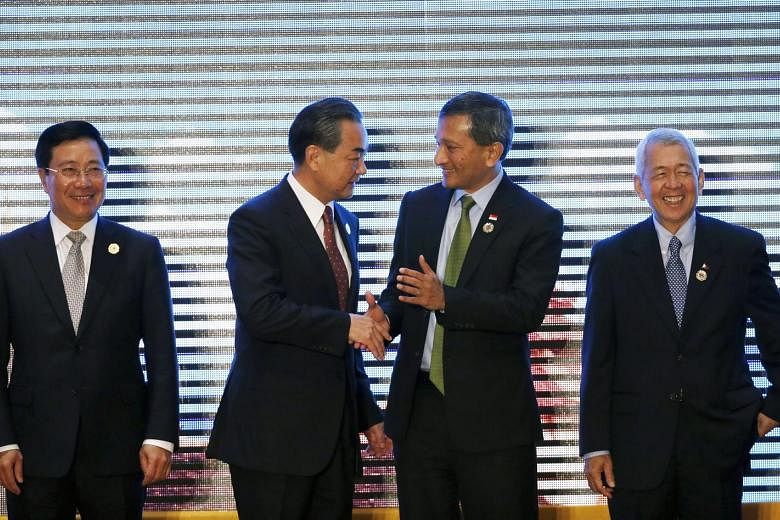Reaching a consensus on Asean's joint statement took at least two special meetings among foreign ministers, phone calls back to various capitals, and the tackling of some hard questions about the nature of consensus itself.
"It was difficult because Asean's credibility was on the line - whether Asean centrality is a concept or whether it is a reality," Singapore Foreign Minister Vivian Balakrishnan told reporters in Vientiane yesterday.
The 49th Asean Foreign Ministers Meeting in Laos ended on Sunday without any agreement on how they were going to mention the South China Sea dispute in their communique.
This was despite a last-minute, late-night meeting proposed by Indonesia on Saturday for the ministers to lay out their positions on the issue, before official talks began.
China, Taiwan and the four Asean nations of the Philippines, Vietnam, Malaysia and Brunei have overlapping claims to the strategic waterway.
China has been increasingly assertive in its claim to almost all of the sea, through its reclamation projects and military build-up in the disputed areas.
Tensions were particularly high after a July 12 Arbitral Tribunal ruling on China's competing claims with the Philippines on a case initiated by Manila under the United Nations' 1982 Convention on the Law of the Sea, known as Unclos. The ruling went overwhelmingly against Beijing.
Cambodia, a close China ally, had reportedly tried to block the mention of the maritime dispute in the joint communique, threatening to create a repeat of the debacle in Phnom Penh in 2012 when disagreement over the issue scuttled the statement altogether.
But key factors came together this time, said various diplomatic sources.
Laos, which chairs Asean this year under a revolving arrangement, was anxious to not have its term tarnished with a failed summit, said one diplomat.
Myanmar's de facto leader and Foreign Minister Aung San Suu Kyi - a newcomer to Asean meetings - set her counterparts thinking by asking about the nature of consensus.
Indonesian Foreign Minister Retno Marsudi was ostensibly Asean's biggest cheerleader at the meet. After another special early-morning huddle yesterday among Asean ministers, she walked out beaming.
"We have reached a very big step," she told The Straits Times.
About three hours later, the joint communique was uploaded on Asean's website.
In the end, the arbitration case at The Hague that so rankled China was not mentioned at all in the communique that reiterated the ministers' concerns about developments in the South China Sea.
But a reference to "full respect for legal and diplomatic processes, without resorting to the threat or use of force, in accordance with the universally recognised principles of international law, including the 1982 United Nations Convention on the Law of the Sea (Unclos)" was included instead in the second paragraph of the document.
Despite criticisms that it had been watered down, Dr Balakrishnan said: "You can't get everything that you want. The key point is that the essence of it, which in this case is about international law, Unclos, small states having access to legal, diplomatic means, those key elements are captured."
The minister dismissed suggestions that it was time for the 49- year-old bloc to relook its consensus approach.
"When you have an association with such great diversity, I think a process in which you are forced to seek consensus is important," he said. "Although it makes it very difficult for the diplomats, makes it very difficult for the ministers, nevertheless that difficulty actually keeps the organisation together."

